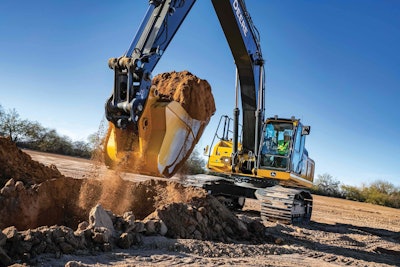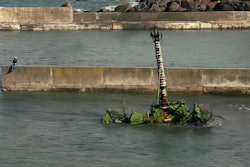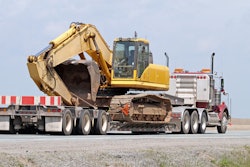
What was behind the surprising Deere-Hitachi excavator split announced in August? What will this mean for Deere customers of both brands?
P RuccoloJohn Deere
RuccoloJohn Deere
"From a customer-support standpoint, I think the best way to put it is that there will be no change," Ruccolo says. Irrespective of brand, Deere dealers will continue to support everything they have sold over the years "indefinitely," he says.
"There's no question that we had a very successful partnership with Hitachi throughout the Americas for more than 30 years," Ruccolo says. But times have changed, and "it was the right time for both of us to make this change," he says. "Where we are really going our separate ways is on the marketing and product support side."
After Feb. 28th, Hitachi Construction Machinery Americas will take over distribution and sale of its excavators. Hitachi plans to manufacture all of its excavators in Japan and import them to the North and South American markets. All manufacturing plants in the joint venture will remain with Deere post-split. This includes its flagship manufacturing facility in Kernersville, North Carolina, as well as plants in Brazil and British Columbia.
That doesn't mean all has ended between the two companies, however. "We're going to continue to have a strong relationship with Hitachi for years to come through our continuing supply agreement with them," Ruccolo says.
Hitachi plants in Japan, for instance, will still make its above 47-metric-ton models, the 670G and 870G, and its 190G wheeled excavator.
Technology centric
During the joint venture, Deere relied on Hitachi's excavator technology, although Ruccolo points out that Deere has developed its own excavator models over the past 13 years that were sold in markets such as Australia, Southeast Asia and Russia. "The agreement gives us the flexibility to transition on a model-by-model basis to Deere technology," Ruccolo says. "We're really excited about the opportunity to control our own journey in excavators."
Ruccolo also says this transition to Deere technology supports the company's overall smart industrial strategy announced in 2020.
"Obviously when we have our own technology in excavators, it makes the deployment of them a lot easier for us," he says. Deere can also apply technologies to excavators that it develops in other markets — notably agriculture — and as the result of acquisitions such as autonomous driving start-up Bear Flag Robotics.
Dealer reaction
Ruccolo says the Hitachi split was not expected by dealers, "and there was a bit of a shock factor."
Still, "there's a lot of excitement and a lot of energy around what the future holds" on the dealer side, he says. "Once we had the opportunity to explain the transition and what the future holds I think generally dealers are quite excited about the future."
He also says that by now Deere dealers are already well-versed in Deere's new smart investment strategy. "Customers are going to experience the same continuity and exceptional support that comes in the form of reliable access to parts, solutions and service," he says.
Three years down the road?
If plans proceed as envisioned, three years from now contractors will look back on an uninterrupted customer experience, Ruccolo says. "We intend to be there every step of the way from a support standpoint for our customers and dealers," he comments.
And will the Kernersville plant start to produce excavators beyond its current 13- to 47-metric-ton segment? Ruccolo declined to comment.
The Deere-designed and manufactured excavator line, however, will be in full transition. "We want to accelerate the development of what we feel is industry-leading technology and machinery," he says. "We're full steam ahead."










